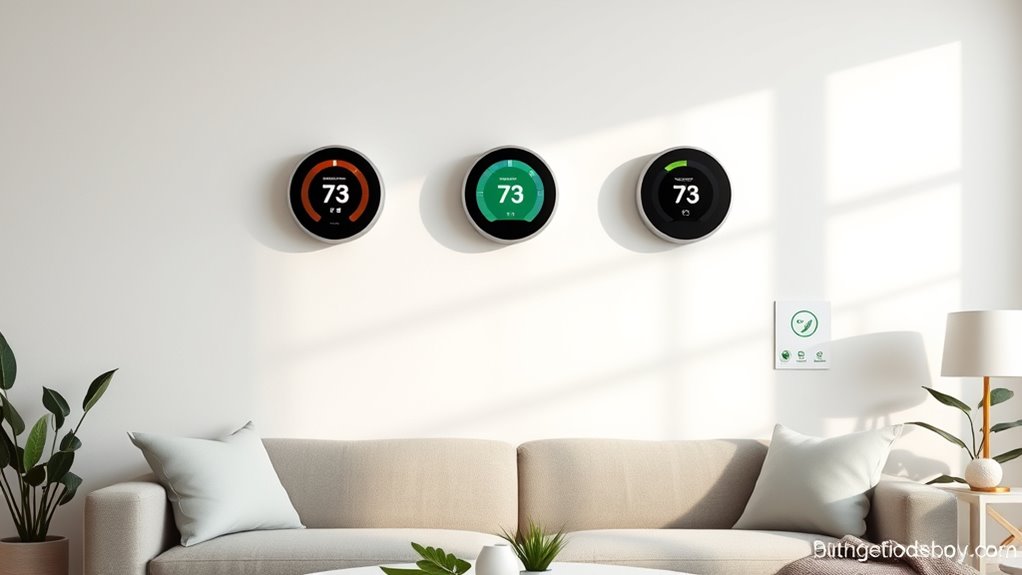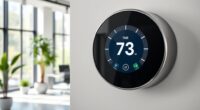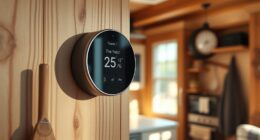If you’re looking for the 15 best smart thermostats in 2025 that prioritize ethical supply chains, I’ve found options that combine advanced features, energy savings, and responsible sourcing. These models include popular brands like ecobee, Nest, Honeywell, and Amazon, all committed to sustainability, fair labor practices, and transparency. Whether you want sleek designs, integrated sensors, or compatibility with smart home systems, there’s a trusted choice for you. Keep exploring to see which options stand out.
Key Takeaways
- The list highlights smart thermostats with transparent, ethically sourced supply chains prioritized for 2025.
- Features include energy efficiency, compatibility with major smart home ecosystems, and user-friendly controls.
- Installation ease and system compatibility are key considerations for diverse HVAC setups.
- Many models offer advanced sensors, remote management, and learning capabilities for optimal comfort.
- Ethical supply chain practices focus on sustainability, fair labor, and responsible sourcing, ensuring trustworthy products.
Amazon Smart Thermostat

If you’re looking for an easy and reliable way to upgrade your home’s heating and cooling system, the Amazon Smart Thermostat is an excellent choice. It supports C-wire installation and integrates seamlessly with Alexa and Ring devices, making voice control simple. Compatible Echo devices include Echo Dot (4th and 5th gen) and Echo Dot with clock (5th gen). The thermostat helps cut energy costs, saving about $50 annually per EPA estimates, and offers remote control via the Alexa app. Amazon’s guided setup and customer support ensure a smooth experience. Built with Honeywell technology, it’s durable, dependable, and backed by over a century of industry expertise.
Best For: homeowners seeking an easy, reliable upgrade to their heating and cooling system with smart, voice-controlled features.
Pros:
- Seamless integration with Alexa and Ring devices for convenient voice control
- Supports C-wire installation, ensuring compatibility with most HVAC systems
- Helps save approximately $50 annually on energy bills, with additional rebate options
Cons:
- Limited compatibility with older or non-standard HVAC systems without a C-wire
- Requires a stable Wi-Fi connection for remote features and automation
- May need assistance for installation if unfamiliar with smart thermostats
ecobee Smart Thermostat Essential, Wi-Fi Programmable Thermostat
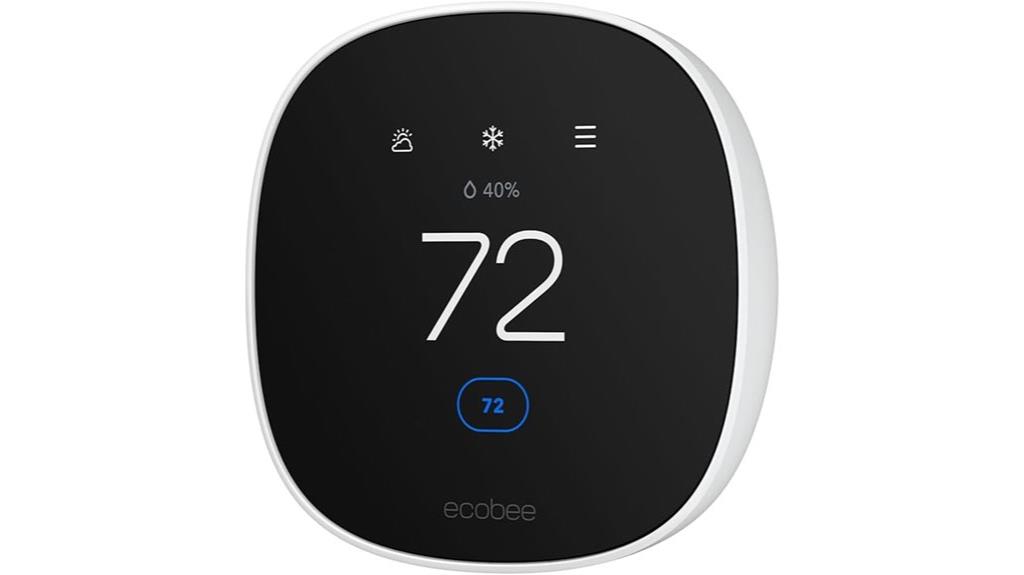
The ecobee Smart Thermostat Essential stands out as an ideal choice for homeowners seeking an affordable, energy-efficient solution that’s easy to install and compatible with popular smart home platforms. It’s Energy Star certified, Wi-Fi enabled, and works seamlessly with Siri, Alexa, Google Assistant, and Apple HomeKit. I appreciate its LCD display, touch controls, auto-scheduling, and fan control, which help optimize HVAC performance. Designed for electric baseboard heaters, air conditioners, and furnaces, it offers significant energy savings—up to 23%, often paying for itself in six months. Installation is straightforward for DIYers, making it a smart, cost-effective upgrade for modern homes.
Best For: homeowners seeking an affordable, easy-to-install smart thermostat that offers reliable energy savings and seamless compatibility with popular voice assistants and smart home systems.
Pros:
- Easy DIY installation with straightforward setup
- Energy savings of up to 23, often recouping costs within six months
- Compatible with multiple smart home platforms including Siri, Alexa, Google Assistant, and Apple HomeKit
Cons:
- Limited scheduling flexibility with only one schedule per season
- Inability to customize schedules in finer detail or set different schedules for each season
- Basic features with some advanced options missing, such as minute-by-minute scheduling
ecobee Smart Thermostat Premium with Sensors and Air Quality Monitor
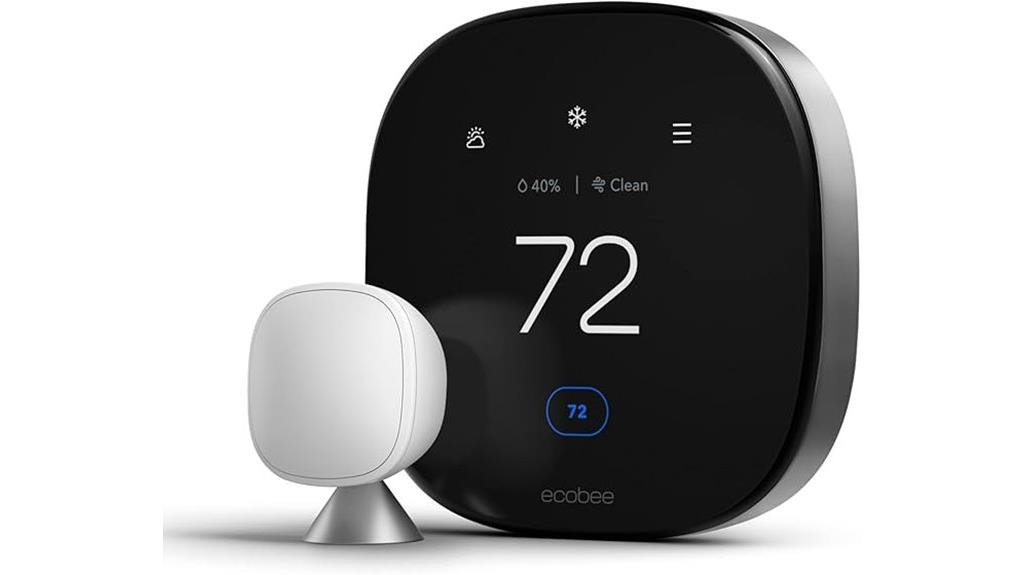
The ecobee Smart Thermostat Premium with Sensors and Air Quality Monitor stands out as an ideal choice for homeowners seeking all-encompassing climate control and air quality management in one sleek device. It can save up to 26% annually on heating and cooling costs, is ENERGY STAR certified, and includes SmartSensors that adjust temperatures in key rooms, reducing hot and cold spots. The built-in air quality monitor alerts you to poor air conditions and reminds you to change filters. Its premium design features a vibrant display and advanced sensing, while security features like smoke detection and break-in alerts make it a thorough smart home hub. Compatibility with most HVAC systems and voice control adds to its versatility.
Best For: homeowners seeking comprehensive energy-efficient climate control, air quality monitoring, and smart home integration in a sleek, user-friendly device.
Pros:
- Saves up to 26% annually on heating and cooling costs, reducing energy bills.
- Built-in air quality monitor alerts to improve indoor air conditions and maintain filter health.
- Compatible with most 24VAC HVAC systems and supports voice control via Siri and Alexa.
Cons:
- Security features require an additional ecobee Smart Security plan for full functionality.
- Apple Home Hub is needed for Siri integration, adding extra setup requirements.
- Premium features and sensors come at a higher cost compared to basic thermostats.
Google Nest Thermostat, Programmable WiFi Thermostat
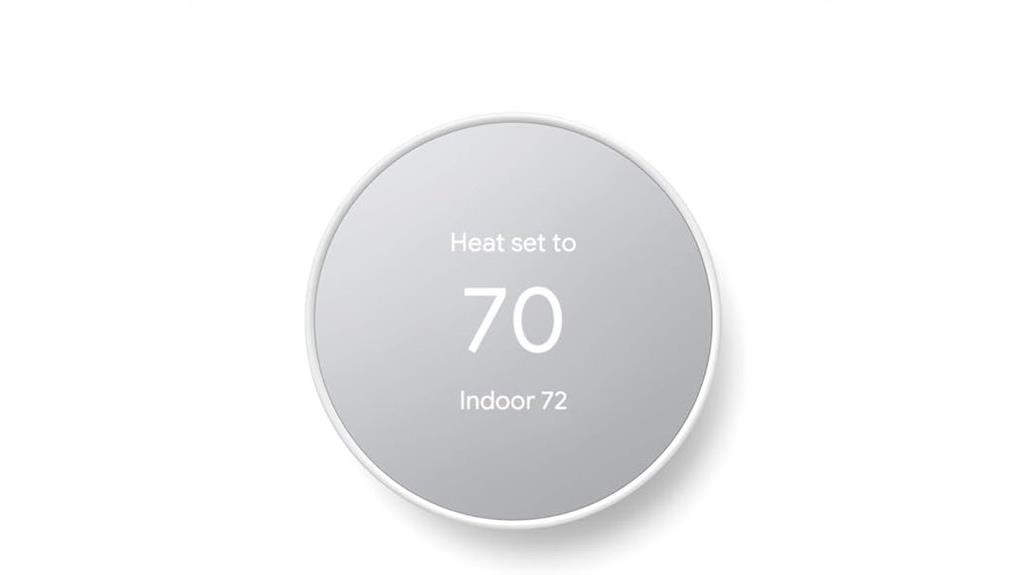
For homeowners seeking an easy-to-install, energy-saving smart thermostat, the Google Nest Thermostat stands out. It’s ENERGY STAR certified, helping reduce energy use by adjusting itself when you’re away. Supporting heating, cooling, and heat pump systems, it features a sleek LCD display and simple button controls. Setup typically takes around 30 minutes, and it connects via Wi-Fi and Bluetooth for remote access through the Google Home app. You can control it with voice commands using Google Assistant or Alexa. Its learning capabilities optimize comfort and efficiency over time, making it a reliable choice—though some users face initial wiring and compatibility challenges.
Best For: homeowners seeking an easy-to-install, energy-efficient smart thermostat that integrates seamlessly with voice assistants and smart home platforms.
Pros:
- ENERGY STAR certified, promoting energy savings and cost reduction
- Supports multiple HVAC systems including heating, cooling, and heat pumps
- Easy DIY installation with a sleek design and intuitive controls
Cons:
- Initial setup can be challenging, especially wiring and system compatibility issues
- Offline functionality is limited, dependent on stable internet connection
- Some users report accuracy concerns with temperature and humidity readings
ecobee Smart Thermostat Enhanced – Programmable Wifi Thermostat

Are you looking to cut energy costs without sacrificing comfort? The ecobee Smart Thermostat Enhanced can help you save up to 26% annually on heating and cooling. It automatically adjusts temperatures when you’re away and preheats or cools your home before you arrive, ensuring immediate comfort. It also monitors humidity and uses SmartSensor technology to focus on key areas, providing consistent comfort. Compatible with Siri, Alexa, Google Assistant, and most smart home platforms, you can control it remotely via the ecobee app or voice commands. Easy to install and Energy Star certified, it’s a smart, reliable choice for energy-efficient home climate control.
Best For: homeowners seeking to reduce energy costs while maintaining precise and convenient control over their home’s climate.
Pros:
- Saves up to 26% annually on heating and cooling costs.
- Compatible with major smart home platforms like Siri, Alexa, and Google Assistant for seamless voice control.
- Easy to install with features like the Power Extender Kit and no need for battery replacements.
Cons:
- May require a C-wire or Power Extender Kit for certain HVAC systems, which could complicate installation.
- Premium features and smart sensors come as optional add-ons, increasing overall cost.
- Compatibility varies with older or non-standard HVAC systems, potentially limiting functionality.
Emerson Sensi Touch Wi-Fi Smart Thermostat
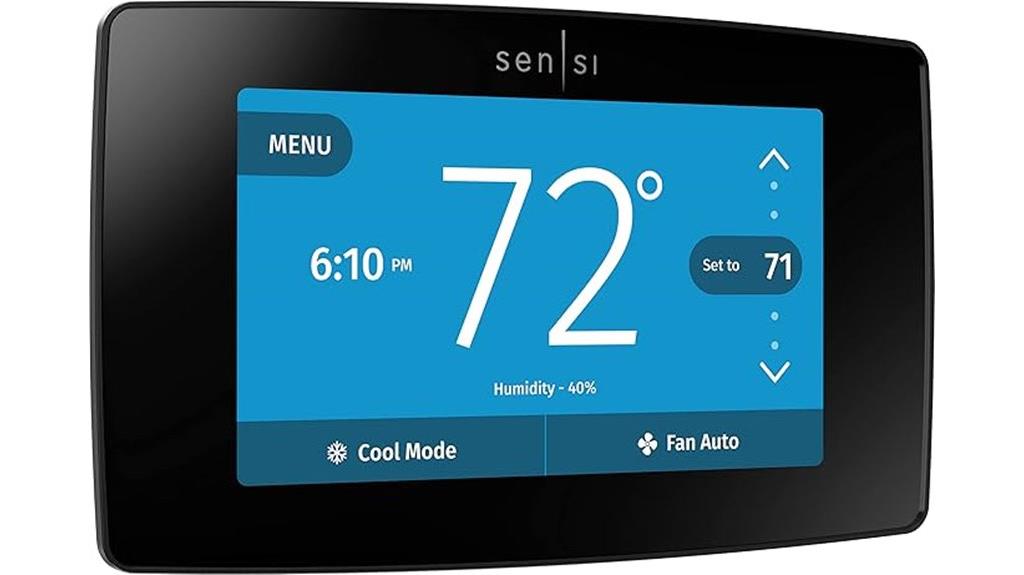
Emerson Sensi Touch Wi-Fi Smart Thermostat stands out as an excellent choice for homeowners seeking easy installation and reliable energy savings. Its large 4.3-inch color touchscreen makes it simple to navigate, and it offers flexible control options like app management, voice commands, and manual touch. Certified by Energy Star, it helps reduce HVAC energy use by around 23%. Designed for DIY installation, it supports a variety of HVAC systems and requires a C-wire for full functionality. With features like usage reports, filter alerts, and geofence technology, it combines convenience with energy efficiency, all while maintaining strong privacy protections and dependable Emerson quality.
Best For: homeowners seeking an easy-to-install, energy-efficient smart thermostat with versatile control options and reliable performance.
Pros:
- Large 4.3-inch color touchscreen for easy navigation and readability
- Supports multiple control methods including app, voice commands, and manual touch
- Energy Star certified, helping save approximately 23% on HVAC energy
Cons:
- Requires a C-wire for full functionality; no battery-only operation available
- Registration and remote features can be limited outside North America, especially in EU regions
- Basic Apple HomeKit support with some functionalities not fully available internationally
Honeywell Wi-Fi Smart Color Thermostat

The Honeywell Wi-Fi Smart Color Thermostat stands out for its customizable full-color touchscreen, making it ideal for homeowners who want both style and advanced control over their home climate. It offers 7-day programmable scheduling, remote Wi-Fi access, and compatibility with platforms like Alexa, Google Home, and SmartThings. The device displays indoor temperature, outdoor weather, humidity levels, and forecasts, providing extensive climate management. Its sleek design, intuitive interface, and customizable display enhance user experience. While installation is straightforward for DIYers, careful wiring is essential. Overall, it combines aesthetic appeal with smart features, making it a reliable choice for modern, environmentally conscious homes.
Best For: homeowners seeking a stylish, customizable smart thermostat with easy DIY installation and comprehensive climate control features.
Pros:
- Intuitive full-color touchscreen display with customizable color options
- Supports remote Wi-Fi access and voice control via Alexa, Google Home, and SmartThings
- Displays indoor temperature, outdoor weather, humidity levels, and forecasts for enhanced climate management
Cons:
- Requires careful wiring and a C (common) wire for installation, which may be challenging for some users
- Limited fan control options (ON, AUTO, CIRCULATING) and no support for remote sensors
- Some app functionalities and features may be region-specific or limited outside the US
Sensi Smart Thermostat
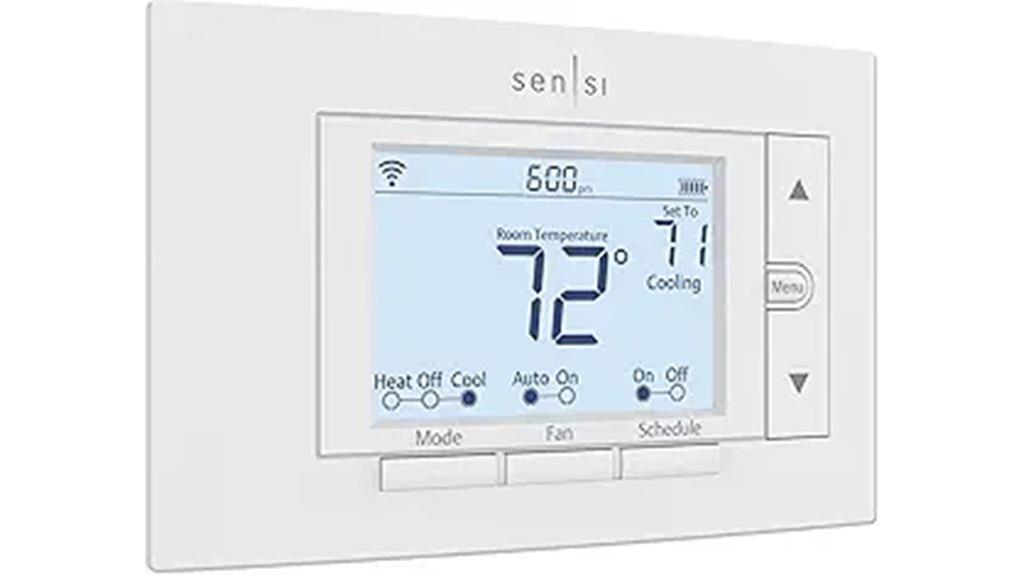
If you’re looking for a user-friendly smart thermostat that seamlessly integrates with your existing HVAC system, the Sensi Smart Thermostat model ST55 is an excellent choice. It offers Wi-Fi connectivity, programmable scheduling, and voice control with Alexa, Google Assistant, SmartThings, and Vera. Its sleek LED display and easy DIY installation mean you won’t need to patch or paint. Compatible with most systems, often without a c-wire, it also features filter indicators, fan control, humidity management, and Energy Star certification, helping you save around 23% on energy bills. Users praise its reliability, ease of setup, and strong app experience, making it a trusted, efficient choice.
Best For: homeowners seeking an easy-to-install, reliable smart thermostat with energy-saving features and seamless voice control integration.
Pros:
- Easy DIY installation with step-by-step app guidance and hardware included
- Compatible with most HVAC systems, often without needing a c-wire
- Energy Star certified, helping save approximately 23% on HVAC energy bills
Cons:
- Limited detailed usage data compared to more advanced models
- No support for Bixby voice control
- Occasional connectivity or setting adjustment issues reported by some users
Sensi Lite Smart Thermostat
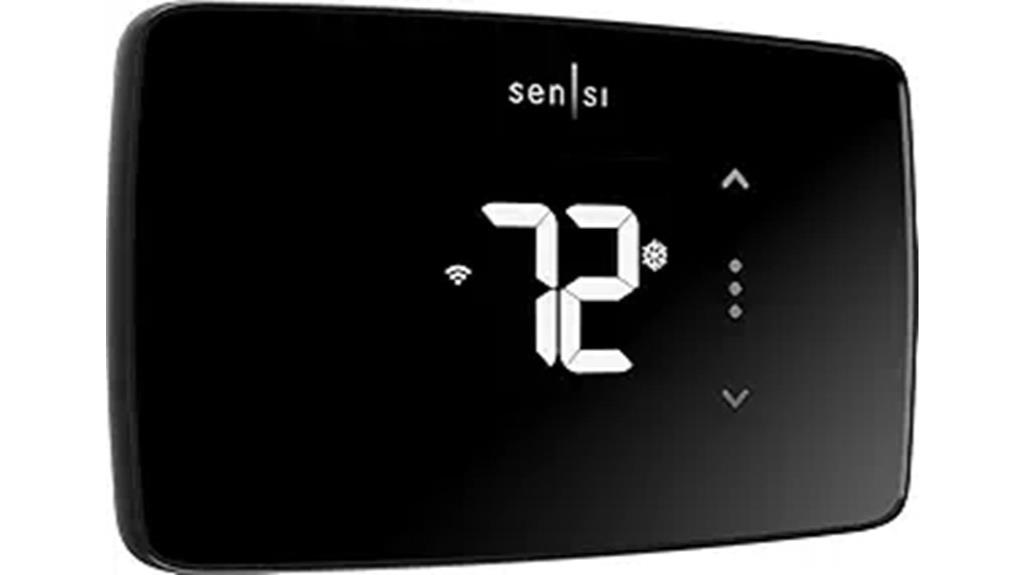
For homeowners seeking an easy-to-install smart thermostat that delivers reliable energy savings, the Sensi Lite Smart Thermostat stands out as an excellent choice. Made by Emerson and Energy Star certified, it offers a sleek LCD display, backlight, and simple design. Compatible with most HVAC systems, including boilers, heat pumps, air conditioners, and furnaces, it supports app control via Wi-Fi and works with Alexa, Google Assistant, and SmartThings. Installation is straightforward, often requiring minimal wiring. Features like programmable schedules, auto changeover, and a filter indicator help optimize comfort and efficiency. Overall, it’s a reliable, user-friendly option for energy-conscious homeowners.
Best For: homeowners seeking an easy-to-install, energy-saving smart thermostat compatible with a variety of HVAC systems and smart home devices.
Pros:
- User-friendly setup with minimal wiring and clear instructions
- Compatible with popular smart home platforms like Alexa, Google Assistant, and SmartThings
- Energy Star certified, offering about 23% HVAC energy savings
Cons:
- Connectivity issues may occur after power outages or battery changes, requiring troubleshooting
- Limited scheduling flexibility and app statistics compared to higher-end models
- Not recommended for global use outside of US and Canada due to compatibility limitations
Meross Smart Thermostat with WiFi and Voice Control
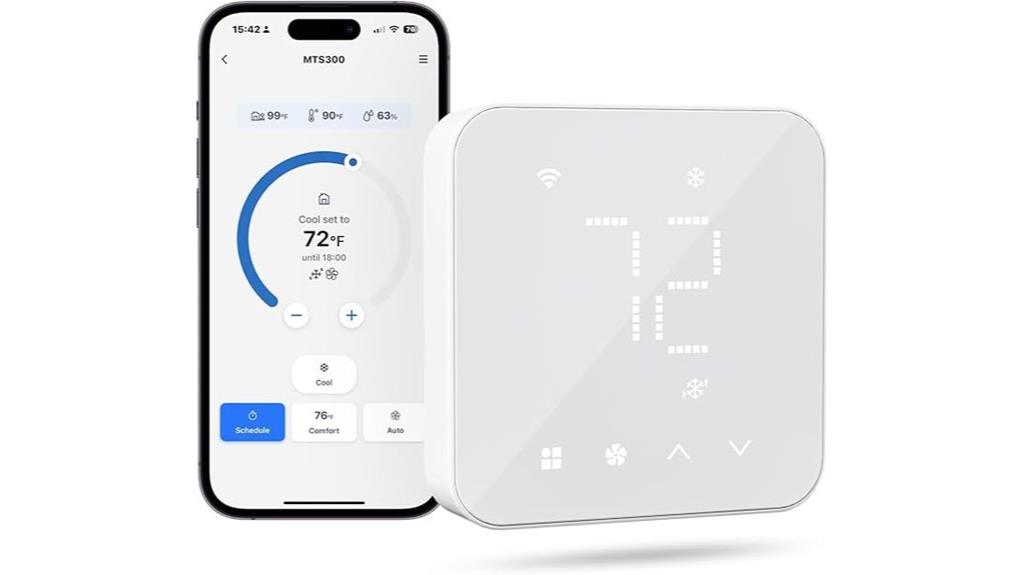
Designed for homeowners seeking reliable, easy-to-use smart home integration, the Meross Smart Thermostat with WiFi and Voice Control offers broad compatibility with most HVAC systems, excluding electric baseboard heaters. It supports 95% of systems, including heat pumps and conventional heating and cooling setups, but requires a C-wire for installation—unless you purchase a Meross C-wire adapter. It connects via 2.4GHz Wi-Fi and supports Matter technology, enabling seamless voice control through Apple Home, Alexa, Google, and SmartThings. You can set customizable schedules, monitor your system remotely, and even operate it offline. Overall, it combines convenience, energy savings, and platform flexibility.
Best For: homeowners seeking a reliable, easy-to-use smart thermostat compatible with most HVAC systems and integrated with popular voice platforms.
Pros:
- Broad compatibility with 95% of HVAC systems, including heat pumps and conventional setups
- Supports Matter technology for seamless local voice control via Apple Home, Alexa, Google, and SmartThings
- Allows customizable scheduling and remote management through the Meross app for added convenience
Cons:
- Not compatible with electric baseboard heaters
- Requires a C-wire for installation unless using a Meross C-wire adapter
- Only supports 2.4GHz Wi-Fi networks, limiting connectivity options
Google Nest Learning Thermostat (4th Gen, 2024) with Nest Temperature Sensor
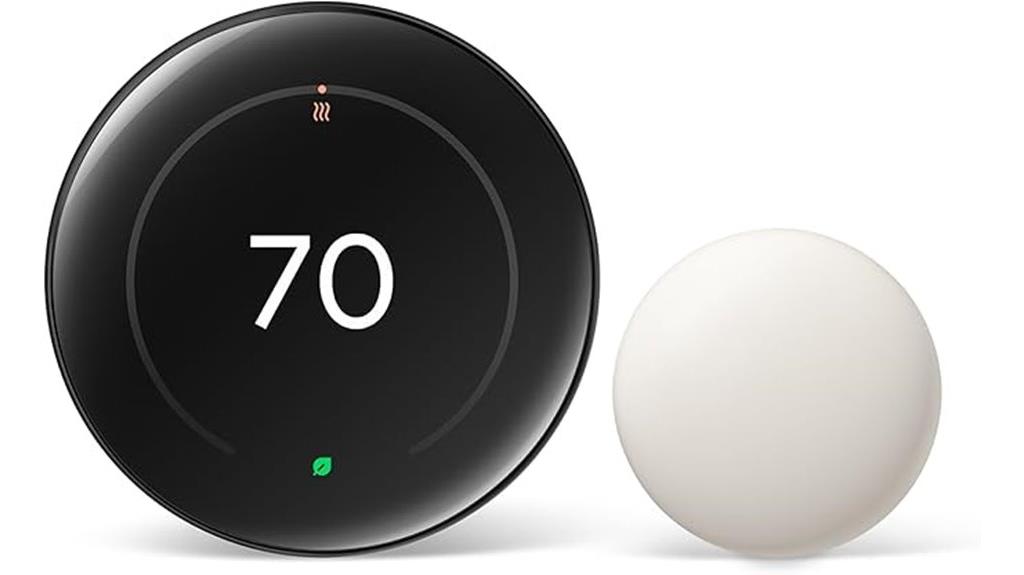
The Google Nest Learning Thermostat (4th Gen, 2024) with Nest Temperature Sensor stands out as an ideal choice for homeowners seeking a highly adaptable and energy-efficient smart thermostat. Its sleek Obsidian finish and larger display with Dynamic Farsight make it easy to read from across the room. It’s simple to install, compatible with most 24V systems, and integrates seamlessly with Alexa, Apple HomeKit, and Google Assistant. The thermostat learns your habits, suggests schedule adjustments, and manages hot and cold spots using Nest Temperature Sensors. With remote control via the Google Home app and voice commands, it offers a convenient, smart, and energy-saving home climate solution.
Best For: homeowners looking for a sleek, energy-efficient smart thermostat that seamlessly integrates with multiple smart home ecosystems and offers advanced learning and sensor capabilities.
Pros:
- Larger display with Dynamic Farsight for easy reading from across the room
- Compatible with Alexa, Apple HomeKit, Google Assistant, and Matter for versatile control
- Learns user habits and optimizes energy savings, reducing heating and cooling costs
Cons:
- May require professional installation for certain HVAC systems
- Some users might find initial setup or customization process complex
- Additional Nest Temperature Sensors are optional and may incur extra cost
Google Nest Learning Thermostat (3rd Gen, 2015)
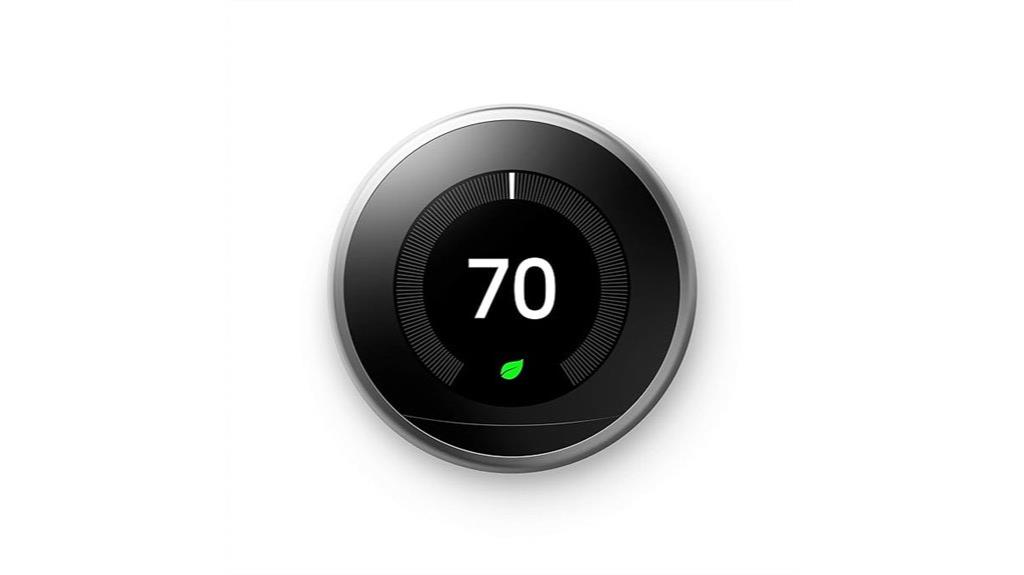
Are you looking for a smart thermostat that truly adapts to your lifestyle? The Google Nest Learning Thermostat (3rd Gen, 2015) is a great choice. It learns your preferences over time and creates an automatic schedule, so you don’t have to program it manually. The thermostat displays your energy usage history and shows the Nest Leaf when you choose energy-saving temperatures, encouraging efficiency. It automatically adjusts when you’re away to save energy. Plus, you can control it remotely via the Nest app. Just make sure to check your system’s compatibility before purchasing to ensure seamless integration with your home.
Best For: homeowners seeking a smart thermostat that learns their schedule and optimizes energy use for enhanced convenience and savings.
Pros:
- Learns user preferences over time to create an automatic, personalized schedule
- Displays energy usage history and encourages energy-efficient choices with the Nest Leaf
- Automatically adjusts temperature when home is unoccupied to save energy and reduce costs
Cons:
- Requires compatibility verification with existing HVAC system before purchase
- May involve a learning curve for users unfamiliar with smart thermostats
- Limited to compatible systems, potentially restricting installation options
Honeywell Home Smart Thermostat with WiFi Compatibility
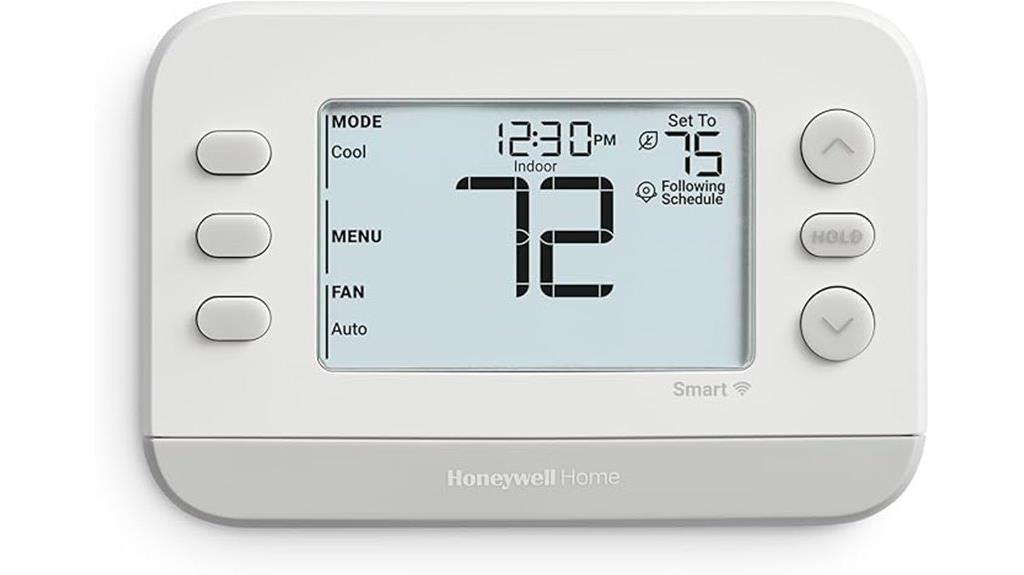
If you’re looking for an affordable, easy-to-install smart thermostat that works well with existing HVAC systems, the Honeywell Home Smart Thermostat with WiFi compatibility is a solid choice. It’s ENERGY STAR certified, supports both conventional and heat pump setups, and features WiFi for remote control via the First Alert app. Its Matter certification guarantees smooth integration with platforms like Alexa, Google Assistant, and Apple HomeKit. The thermostat offers flexible scheduling, geofencing, and filter reminders, helping save energy. While some users face WiFi connectivity issues, many appreciate its simple setup, customizable display, and reliable basic functions, making it a practical, budget-friendly option.
Best For: budget-conscious homeowners seeking an easy-to-install smart thermostat compatible with existing HVAC systems and smart home platforms.
Pros:
- Simple and quick installation, especially with a compatible C-wire
- Supports multiple smart home platforms via Matter certification, including Alexa, Google Assistant, and Apple HomeKit
- Offers flexible scheduling, geofencing, and energy-saving features at an affordable price
Cons:
- Connectivity issues such as frequent WiFi disconnections and offline status reports
- Basic control options within Apple HomeKit, limited to temperature adjustments and automation
- Occasional user reports of internal sensor failures and display malfunctions shortly after setup
Honeywell WiFi Smart Thermostat (RTH8800WF2022)
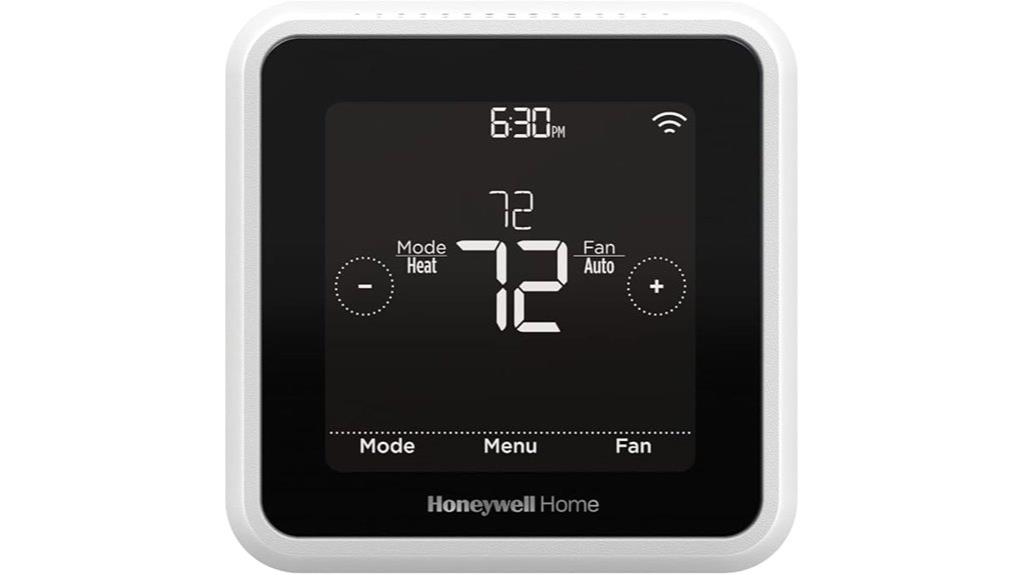
For homeowners seeking a versatile and energy-efficient smart thermostat, the Honeywell WiFi Smart Thermostat (RTH8800WF2022) stands out thanks to its 7-day programmable touchscreen and compatibility with most heat/cool systems. It supports many systems, including oil furnaces, though a C-wire adapter may be needed for certain setups. Its energy-saving features, like scheduling and geofencing, can cut heating and cooling bills by 8-16%. Certified by ENERGY STAR, it promotes efficiency and offers monthly energy reports and personalized tips. Easy to control via touchscreen or Alexa, it adapts to your schedule and helps optimize home comfort and energy use.
Best For: homeowners seeking a versatile, energy-efficient smart thermostat compatible with most heat/cool systems, including oil furnaces, and looking to optimize home comfort and reduce energy bills.
Pros:
- Supports 7-day programmable scheduling for personalized comfort.
- Compatible with Alexa for voice control and easy integration.
- ENERGY STAR certified, promoting energy savings and efficiency.
Cons:
- May require a C-wire power adapter for certain heating systems.
- Not compatible with heating-only oil systems without a C-wire.
- Setup and configuration can be complex for non-technical users.
Smart Thermostat with Room Sensor and Touchscreen
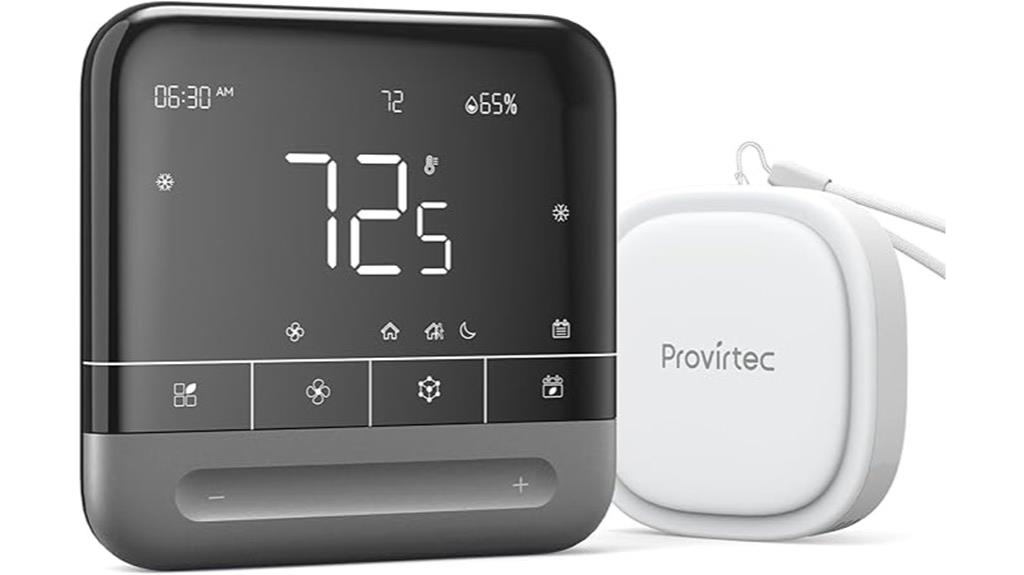
A smart thermostat with a room sensor and touchscreen is ideal for homeowners seeking precise climate control and easy operation. It supports over 95% of 24VAC HVAC systems, including central air, heat pumps, boilers, and furnaces, but needs a C wire for installation. Its 7-day schedule, Sleep/Home/Away modes, and real-time monitoring via the Provirtec thermo-hygrometer help optimize comfort and save energy—up to 26% annually. The large 3.95-inch touchscreen and user-friendly sliding design make adjustments effortless for all ages. With WiFi and app control, you can manage your home’s temperature remotely, ensuring comfort and efficiency at all times.
Best For: homeowners seeking precise, easy-to-use smart climate control compatible with most 24VAC HVAC systems and interested in energy savings and remote management.
Pros:
- Supports over 95% of 24VAC HVAC systems, including central air, heat pumps, boilers, and furnaces
- Features a large, user-friendly 3.95-inch touchscreen with smart sliding design for effortless adjustments
- Enables remote control, scheduling, and real-time monitoring via the Prodigytec app and WiFi connectivity
Cons:
- Requires a C wire for installation; not compatible with high-voltage or millivolt systems
- Does not support S terminals for indoor/outdoor sensors, limiting outdoor sensor integration
- Firmware updates necessitate WiFi connection, which may require stable internet access
Factors to Consider When Choosing a Smart Thermostat With Ethical Supply Chain
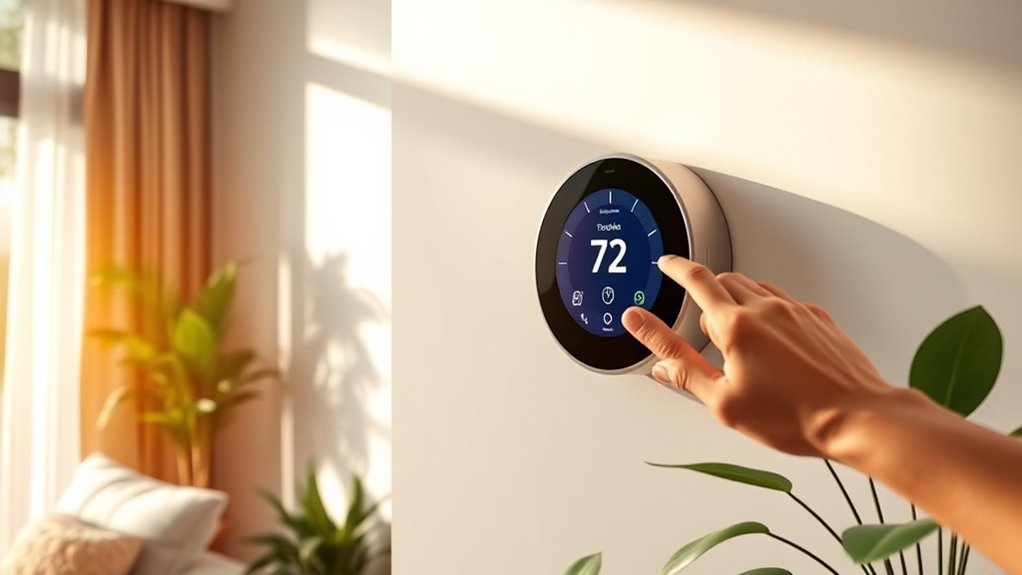
When choosing a smart thermostat, I believe it’s important to contemplate the ethical aspects of its supply chain. Factors like ethical material sourcing, fair labor practices, and sustainable manufacturing can make a real difference. By paying attention to transparent supply chains and eco-friendly packaging, we can support more responsible and environmentally conscious choices.
Ethical Material Sourcing
Choosing a smart thermostat with an ethical supply chain means ensuring that the materials used are sourced responsibly and transparently. I look for brands that provide clear reports or certifications like Fair Trade, Responsible Minerals Initiative, or Conflict-Free Mineral Certification, which verify ethical sourcing. Responsible sourcing involves tracing the supply chain to prevent conflict minerals and environmentally harmful practices. It’s important that the raw materials—like minerals and metals—are obtained without supporting conflict zones, child labor, or human rights violations. Eco-friendly extraction methods and recycled materials also matter, as they reduce ecological impact. As consumers, we can influence this process by demanding supply chain transparency, supporting brands committed to responsible sourcing, and advocating for higher industry standards. Ethical material sourcing is essential for truly sustainable and trustworthy smart thermostats.
Fair Labor Practices
Ensuring fair labor practices is essential when selecting a smart thermostat with an ethical supply chain, as it guarantees that workers are paid fairly and work in safe conditions. Companies committed to ethical supply chains routinely conduct audits to verify compliance with labor rights standards, guaranteeing no exploitation occurs. They strictly prohibit forced labor, child labor, and human trafficking, aligning with international conventions like those from the ILO. Transparency in sourcing and production processes allows consumers to confirm that products are made under fair labor conditions. Certifications such as Fair Trade and Ethical Trading Initiative membership serve as reliable indicators of adherence to fair labor practices. Prioritizing these factors helps ensure that your smart thermostat supports ethical treatment of workers throughout its supply chain.
Sustainable Manufacturing Processes
Sustainable manufacturing processes are essential in selecting a smart thermostat with an ethical supply chain because they directly impact the environment and resource use. I look for manufacturers that prioritize reducing carbon emissions by using renewable energy sources and energy-efficient methods. Ethical supply chains also mean sourcing raw materials responsibly, like conflict-free minerals and recycled components, to minimize environmental and social harm. Companies committed to sustainability often implement waste reduction strategies, such as recycling scrap and optimizing resource use during production. Certifications like ISO 14001 or LEED signal that a company follows environmental management standards. By focusing on these practices, I can ensure the thermostat I choose supports eco-friendly manufacturing and aligns with my values of environmental responsibility and ethical sourcing.
Transparent Supply Chains
Have you ever wondered how much you can really trust the origins of a smart thermostat’s parts? Transparency in supply chains is essential for that trust. Companies that openly share details about their sourcing practices and labor conditions give us confidence in their products. They often publish reports on environmental impact and ethical standards, helping us see whether they’re committed to responsible practices. Transparent supply chains help identify and eliminate unethical issues like child labor, forced labor, or environmental harm. This openness allows us to make informed choices aligned with our values. Plus, with increasing regulations and industry standards, more brands are required to disclose their supply chain details. Choosing a thermostat from a transparent company means supporting ethical sourcing and responsible manufacturing.
Eco-Friendly Packaging
Ever thought about how your smart thermostat’s packaging impacts the environment? Choosing eco-friendly packaging means supporting materials that are biodegradable, recyclable, or compostable, reducing plastic waste and environmental harm. Manufacturers committed to ethical supply chains often use sustainably sourced paper, cardboard, or minimal packaging to lower transportation emissions and energy use. Certifications like FSC or recycling symbols show responsible sourcing and disposal options, giving you confidence your purchase aligns with eco-conscious values. Opting for these products helps promote companies that prioritize environmental stewardship and sustainable practices. By paying attention to packaging, you’re making a small yet meaningful difference—reducing waste, conserving resources, and encouraging responsible manufacturing. It’s a simple step toward a greener, more ethical approach to technology.
Responsible End-of-Life
When selecting a smart thermostat, considering how it will be disposed of at the end of its life is just as important as its features and energy savings. Proper disposal prevents environmental contamination from hazardous materials like batteries and electronic components. Reputable manufacturers often offer take-back programs or partner with certified e-waste recyclers to ensure eco-friendly disposal. This responsible approach also helps protect your data, as devices are securely erased before recycling. Legislation such as the WEEE Directive in Europe and similar programs worldwide mandate responsible e-waste handling, emphasizing producer responsibility. Choosing thermostats with clear end-of-life policies and certified recycling options allows you to minimize your ecological footprint and support sustainable electronics management, aligning your purchase with ethical and environmental standards.
Corporate Social Responsibility
Considering the growing importance of ethical practices, it is vital to evaluate a smart thermostat’s supply chain before making a purchase. Companies committed to Corporate Social Responsibility (CSR) ensure their suppliers follow ethical labor standards, environmental sustainability, and fair trade principles. Transparency is key; responsible firms conduct audits and seek certifications to verify ethical sourcing and production methods. They prioritize sourcing materials from regions and suppliers that uphold workers’ rights, prohibit child labor, and offer safe working conditions. Implementing CSR reduces risks like reputational damage, legal penalties, and supply disruptions caused by unethical practices. Additionally, consumers increasingly prefer brands with transparent, responsible supply chains, which influences companies to invest in ethical sourcing. Choosing a thermostat with a verified ethical supply chain aligns with my values and promotes sustainability.
Frequently Asked Questions
How Do Ethical Supply Chains Impact Smart Thermostat Pricing?
You’re wondering how ethical supply chains influence smart thermostat prices. I believe they can make products a bit pricier because companies often invest more in sustainable materials and fair labor practices. However, I also think these costs can lead to higher quality, longer-lasting thermostats. While the upfront expense might be higher, I see it as a worthwhile investment in ethical practices and better durability, ultimately benefiting consumers and the planet.
Are There Certifications Verifying Ethical Sourcing for Smart Thermostats?
You might think certifications alone guarantee ethical sourcing, but they’re just one piece of the puzzle. Yes, there are certifications like Fair Trade and B Corp that verify responsible practices, giving you peace of mind. I always look for these labels when choosing products, including smart thermostats, because they guarantee ethical materials and fair labor. Trusting certified brands helps me support sustainable practices and hold companies accountable.
Can Ethical Supply Chain Practices Influence Device Longevity?
When I consider how ethical supply chain practices impact device longevity, I realize they often lead to better quality materials and manufacturing processes. Companies committed to sustainability tend to invest in durable components and responsible production, which means their devices last longer. As a consumer, I find that choosing ethically made smart thermostats not only supports ethical practices but also guarantees I get a more reliable, long-lasting product.
Which Brands Prioritize Transparency in Their Supply Chain Ethics?
Think of a brand as a lighthouse guiding us through foggy waters. I believe brands like Nest, Ecobee, and Honeywell shine brightly with transparency in their supply chains. They openly share their sourcing practices and labor standards, building trust like sturdy beams in a house. When companies prioritize honesty, they not only protect workers and the planet but also create devices that last longer, making your investment truly worth it.
How Do Ethical Considerations Affect Smart Thermostat Energy Efficiency?
Ethical considerations can influence smart thermostat energy efficiency by encouraging brands to prioritize sustainable materials and fair labor practices. When companies focus on transparency, they often develop products with better energy management features, knowing their supply chain impacts sustainability. I believe that choosing ethically-made thermostats not only supports responsible manufacturing but also promotes smarter energy use, helping me reduce my carbon footprint while ensuring the products I use are environmentally and socially responsible.
Conclusion
Choosing a smart thermostat is like planting a seed for a greener future. When you pick one from brands with ethical supply chains, you’re nurturing a tree that offers shade, fruit, and hope. Each decision we make is a drop in the vast ocean of change, rippling outward. Let’s guarantee our choices are rooted in integrity, so our homes—and the planet—can flourish together, basking in the warm glow of responsible innovation.
